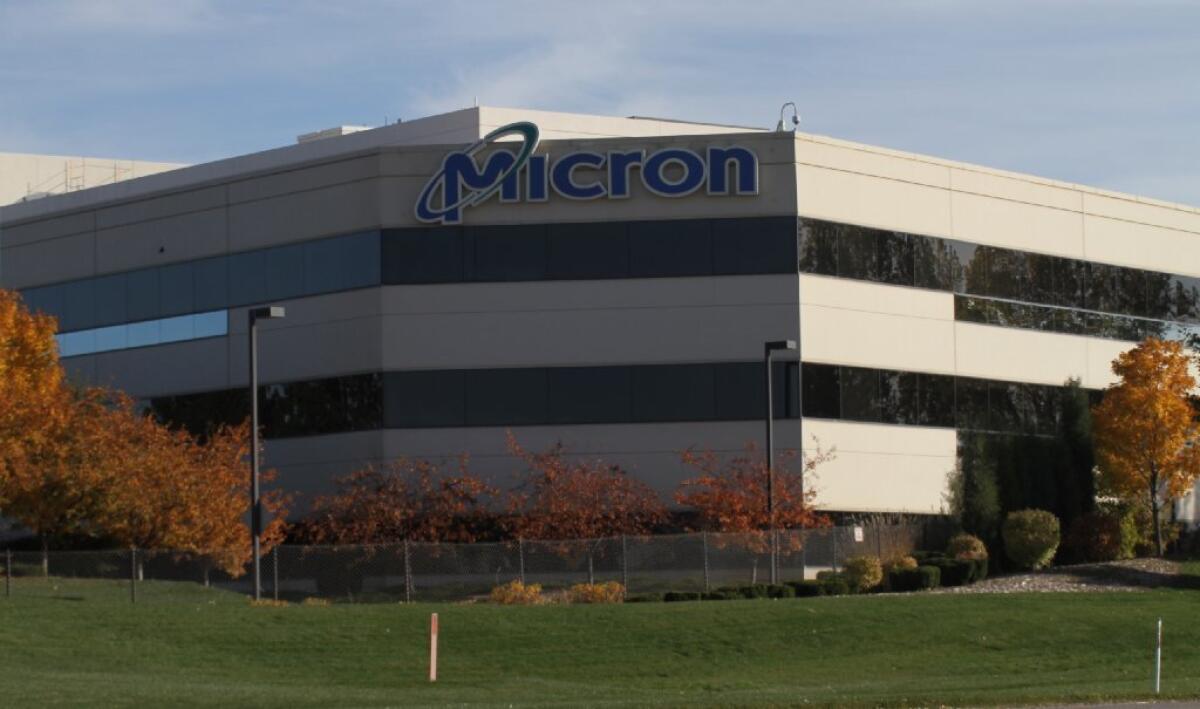Chinese bid for chip maker Micron Technology could face U.S. scrutiny

Micron Technology Inc.’s headquarters in Boise, Idaho. A state-owned Chinese company reportedly is eyeing a takeover of the chip maker.
- Share via
A Chinese company’s reported interest in buying U.S. chip maker Micron Technology Inc. for $23 billion could face the same opposition that derailed a Chinese takeover of an American oil company a decade ago.
Micron is the only major U.S. producer of memory chips used in personal computers and smartphones, and putting that technology in the hands of a state-owned Chinese company is expected to raise concerns about U.S. national security.
The chips made by the Boise, Idaho, company also are used in some defense and sensitive data-storage applications that could make it tougher to get U.S. approval of any takeover, some U.S. officials and analysts said.
“There’s a multitude of reasons it would not receive clearance,” said Timothy Arcuri, a managing director at investment firm Cowen & Co.
China’s Tsinghua Unigroup Ltd. was said to be preparing an offer of $21 a share for Micron, which would be the largest Chinese takeover of a U.S. company. Micron said it had not received an offer and declined to comment.
Should an offer materialize, it would have to be approved by the Committee on Foreign Investment in the United States, an interagency panel led by the Treasury Department.
“I can’t fathom that the committee that reviews these things would approve such a sale,” said Sen. James Risch (R-Idaho), who sits on the Senate Intelligence Committee. “There are computer chips in nearly everything we use in national defense.”
There were similar protests in 2005 when CNOOC Ltd., a major Chinese oil company, offered to buy California-based Unocal Corp. for $18.5 billion.
U.S. politicians cited American energy security in opposing that deal, and CNOOC later dropped its bid in the face of the complaints. Unocal eventually was bought by Chevron Corp.
Micron, a leader in dynamic random-access memory chips, has about 30,000 employees and posted sales of $16.4 billion in its fiscal year that ended Aug. 28.
“Having a strong domestic maker of that [chip] technology is something that’s of strategic value to the United States,” said John Villasenor, a professor at UCLA’s Anderson School of Management.
Other former U.S.-based DRAM makers, such as chip giant Intel Corp., stopped making the memory chips years ago when they largely became commodities and profit margins narrowed, Arcuri said. That’s when much of DRAM production shifted to Asia.
Besides Micron, two South Korean companies also are major DRAM makers: Samsung Group and SK Hynix Inc.
With memory chips finding added use in mobile electronics, China is eager to build its own DRAM production business rather than continuing to buy from others.
For China, acquiring Micron not only would dwarf its previous largest takeover of a U.S. company, the $4.7-billion purchase of Smithfield Foods in 2013, it would help China achieve greater independence on a key strategic product.
China last year imported more than $219 billion of electronic integrated circuits, including memory chips, making the total value of those imports second only to oil and petroleum products at $228 billion. The U.S. was the fifth-largest exporter of chips to China, accounting for about $11 billion in sales last year.
Perhaps expecting opposition to the Micron bid, some investors also seemed to have their doubts about whether Tsinghua Unigroup’s effort, first reported by the Wall Street Journal, would succeed.
After soaring 11% on Tuesday when the reports surfaced, Micron’s stock dropped 72 cents, or 3.7%, to $18.89 a share Wednesday.
The stock had traded at $36 a share in December before moving lower this year, leading some analysts to say that Micron would reject Tsinghua Unigroup’s offer as too low in any case.
If a deal is reached, the Committee on Foreign Investment “is going to be very tough and rigorous” in looking at it because Tsinghua Unigroup is “a state-owned enterprise, and that gets a much harder review,” said Edward Rubinoff, a partner at the law firm Akin Gump Strauss Hauer & Feld.
Approval of any deal also would be hampered by the sparring that Washington and Beijing have engaged in over cybersecurity and serious hacking cases traced to China.
“The general background or tone would be negative,” said Nicholas Lardy, a China economy expert at the Peterson Institute for International Economics.
The committee also would probably get an earful from the Pentagon, said James Lewis, a security expert with the Center for Strategic and International Studies.
“The Department of Defense has a reluctance about transferring this kind of technology to China,” he said.
Times staff writer Don Lee in Washington, D.C., contributed to this report.
More to Read
Inside the business of entertainment
The Wide Shot brings you news, analysis and insights on everything from streaming wars to production — and what it all means for the future.
You may occasionally receive promotional content from the Los Angeles Times.











